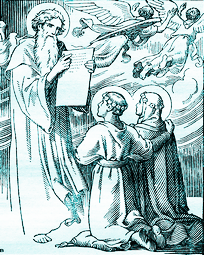Lives of the Saints
Our Models and Protectors
Spiritual Bouquet:
January 9

Saint Julian
Martyr
(† 313)
and Saint Basilissa
his wife
(† 4th century)
Saint Julian and Saint Basilissa, though married, lived by mutual consent in perpetual chastity. They sanctified themselves by the most perfect exercises of an ascetic life, and employed their revenues in relieving the poor and the sick. For this purpose they converted their house into a kind of hospital, in which they sheltered up to a thousand poor people. Basilissa attended those of her sex in separate lodgings, and Julian, who for his charity is known as the Hospitaler, cared for the men.
Egypt, where they lived, was in those days blessed with persons who, either in the cities or in the deserts, devoted themselves to the most perfect exercises of charity, penance, and mortification. Conversions were numerous, and persecutions by furious pagans followed as the numbers of Christians increased. Basilissa, after having survived seven of those, died in peace, foretelling to her husband that he would die a martyr. Julian lived afterwards for a number of years, but eventually received the crown of a glorious martyrdom in 313. His interrogation and his tortures were accompanied by astonishing prodigies and numerous conversions.
With him died thirty-one other persons, including a priest named Anthony, a new Christian named Anastasius, Celsus, the seven-year-old son of the judge who sentenced Julian, Marcianilla, the mother of Celsus, who when she came to visit her son was won over to the faith, and many other Christians. Spared by fire and wild beasts, Saint Julian finally was decapitated. His tomb became illustrious by many great miracles, including the cure of ten lepers on the same day.
Many churches and hospitals, in both the East and in the West, bear the name of one or another of these martyrs. Four churches at Rome and three in Paris are dedicated to Saint Julian.
Reflection. God often rewards men for works that are pleasing in His sight by giving them grace and opportunity to do other works higher still. Such was the case for Saint Julian, whose posthumous miracles attained prodigious numbers.
Little Pictorial Lives of the Saints, a compilation based on Butler's Lives of the Saints and other sources by John Gilmary Shea (Benziger Brothers: New York, 1894); Les Petits Bollandistes: Vies des Saints, by Msgr. Paul Guérin (Bloud et Barral: Paris, 1882), Vol. 2